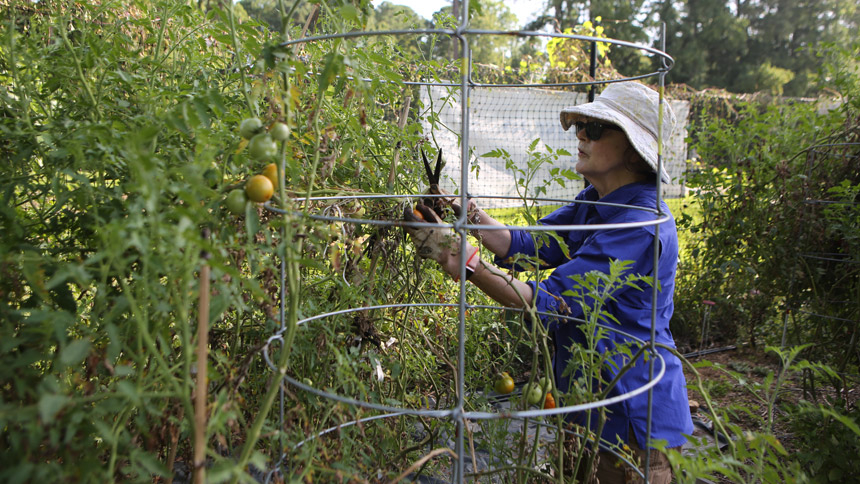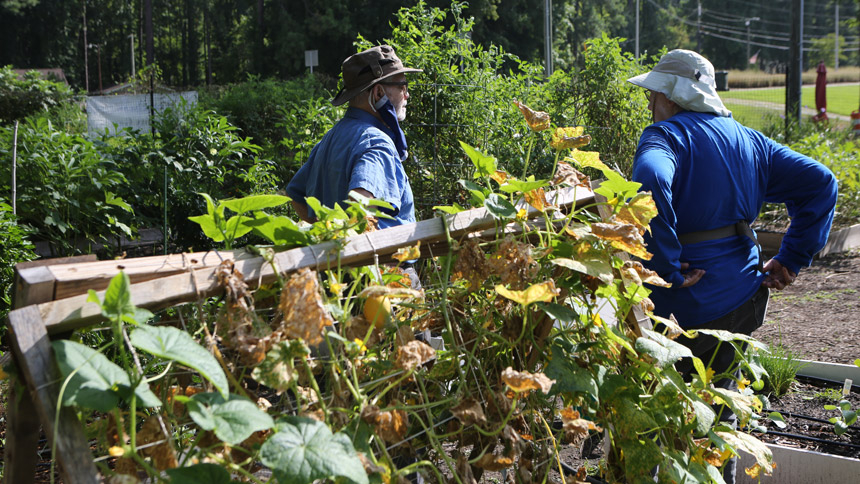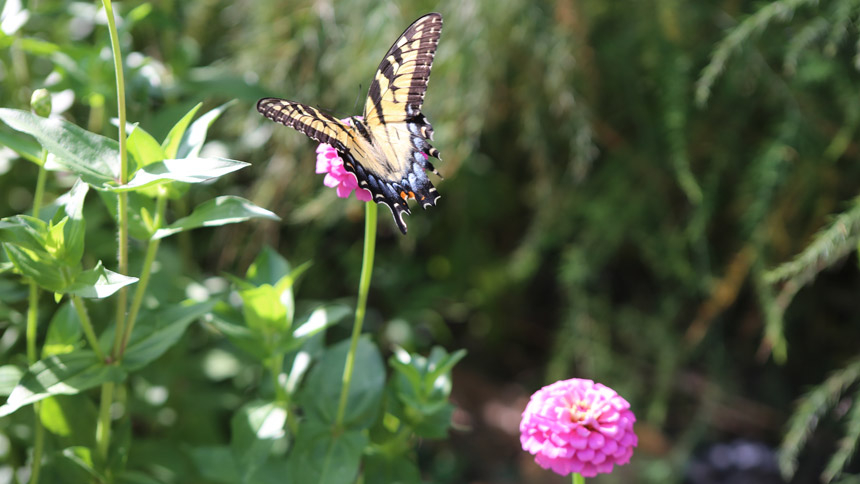
Above: Pat Kelly
Leaves and fronds whisper as they wave gently to and fro in the breeze. Bees buzz among the petals as birds flit and call to one another among the trees. Water flows in a soft murmur down a rock fall near a grotto of Our Lady, shaded by leafy green trees and bushes.
This is Our Lady’s Garden, a decades’ long labor of love for Beverly Thomson.
Thomson, like so many other gardeners, finds working hands in dirt to be a source of peace and renewal. The gardens themselves yield food for both soul and body.
Food for the Spirit
“It started out specifically because I was searching,” she said.
Her husband, Bob, was ill. She had no children, no family close by and felt very alone. She joined the Legion of Mary in 1993, which brought her peace and joy, and a focus on the garden. In the spirit of the legion, she dedicated her efforts to Mary.
Thomson said she told Mary the garden was for her, and gave her labor and love to Mary “in gratitude for seeing me and Bob through all of this.”
The garden grew.
“Whenever I had any money, I bought something and planted it,” Thomson said. She bought slate stones, two at a time, for years.
“When lifting stones and carrying them makes you tired, you sleep well at night,” she said.
Today, garden paths wind through flowering plants, trees and shrubs, while a variety of winsome creatures peek out from underneath leafy fronds or hang amidst the trees. Each turn of the path holds a surprise.
God’s creatures also come to visit this place of peace and beauty. Birds, bees, squirrels, raccoons, deer, rabbits, heron have all been here, and some of them have made a meal out of particularly delicious plantings.
Thomson points to the pond at the bottom of the waterfall. “I had goldfish, and that big old heron came and ate my goldfish up. But I don’t mind. They can munch all they want,” she said.
Food for the Body
For humans, too, gardens are a source of food and life. The increasing popularity of community gardening has yielded a practical benefit - crops donated by the ton to hungry people who may not otherwise have access to fresh fruits or vegetables.
St. Francis of Assisi Parish in Raleigh started a community garden in 2010 out of a concern for economic social justice and food insecurity in Wake County.
“Care of creation is one of the seven Catholic social justice initiatives, so it fits spiritually,” said Pat Kelly, one of the garden’s founding members.
Working in the garden builds community as well. Speaking of the garden’s many volunteers, she said, “They love the aspect of developing community and being friends and supporters of one another as well as keeping our garden growing and productive.”
And productive it is. Over the years, the garden has averaged donations of 2,000 pounds of vegetables and herbs a year.
St. Francis delivers what they grow to Logan’s Garden Shop in Raleigh as part of the national Plant A Row program, through which home, community and commercial gardeners commit to donate at least one row of their produce to feed the hungry. Logan’s starts gardeners in the program with donations of seeds and soil, then collects and refrigerates fruits, vegetables and herbs gathered from gardens across Wake and Johnson Counties.
“You see the little child coming in with just a sandwich baggie of cherry tomatoes, who is so proud because they know that they are giving back to someone else in need, and then you see the truckload of cabbage head coming in from the prison,” said Leslie Logan Brown, Logan’s CFO. “Everybody’s experiencing the same thing inside which is, like, ‘I am giving something that I grew with my hands, and I’m going to help someone else eat.’”
Following a donated cucumber from garden to table can be difficult, but Brown noted that one thing can be measured: how community comes together and how people’s lives have been changed.
“I’ll never forget the prisoner who was working at Johnson County. He told the gentlemen that ran that garden: ‘I am so grateful. I never thought I could fix what I had done, but somehow here in this garden, giving of myself and knowing that I am helping to feed the hungry, I feel like I’m somehow giving back and paying back what I owe.’”
To date, Logan’s has gathered over 350,000 pounds of produce. Twice a week, the Interfaith Food Shuttle picks up the stored produce and delivers it to outlets that distribute food to the needy. One of those places is Catholic Parish Outreach.
“Interfaith Food Shuttle is our go to for produce,” said Deanna McCulloch, assistant director at CPO.
Prior to COVID-19, Interfaith delivered three to four trucks a day with six to eight pallets of fresh produce. Now it’s twice a week. A bag of that fresh produce for a family might weigh 12-13 pounds; at times it might be accompanied by a couple of heads of cabbage, a bag of tomatoes, a large bag of slaw, grapes or maybe a watermelon.
For McCulloch, the Lord’s Prayer is a spiritual guide to work and life, especially the phrase “give us this day our daily bread.”
“How humbling is it to ask for food, and how humbling is it to be a part of assisting someone in what may be the worst time of their life?” she said.
Food for the Heart
“The thing about a garden is, it teaches you everything you need to know,” said Brown. “You learn patience there. You learn humility there. You learn that getting dirty is part of the process, and that perfection doesn’t really exist. And you learn how to appreciate things like waiting. You learn to appreciate seasons, like it’s not always springtime, because you need winter, too. When the abundance isn’t here and it’s winter in your life and it’s cold, it’s like, ‘Oh, I remember that the garden needed that season so I need it too.’”
She added that all of those things lead people to God.
“All of those things lead us deeper in our hearts and open a space for us to hear the things that make us whole,” Brown said.
Thomson knows that well. Her husband, Bob, eventually became a recluse, confined to the house, and living in the dark, for 10 years, she said. She cared for him, but it was a difficult time of pain and suffering.
One day, he suddenly walked out the door and said to her, “I want to see the garden.” Though he had not walked hardly at all for years, she took him by the hand and walked him up a path to the pergola, from where he could survey the whole garden. After winding back through the pathways, she said he held her hand and looked at her and said, “Now I see.”
“But it was beyond seeing the garden. I think the angels were calling him,” Thomson said. “He thanked me for this garden … Then he came over, kissed me on the cheek, and said, ‘I love you.’”
For Thomson, the experience taught her that no matter what happens she will try to make it her best life. “I will continue working in the garden, probably getting poison ivy here and there. It just makes me happy,” she said.





